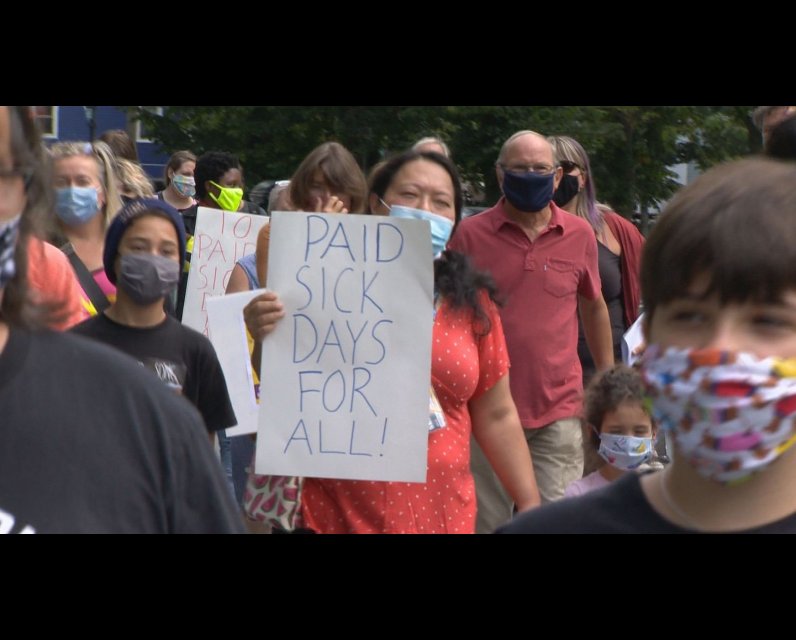Unpublished Opinions
Unpublished.ca is a web portal on politics and current affairs in Canada. It provides the opportunity for Canadians to dig deeper into the issues affecting them, and to weigh-in on these issues in a persuasive and respectful way. Join the movement and have your say today!
U of T Historians condemn Ford government not funding sick paid-leave during COVID-19 pandemic

As faculty of the University of Toronto’s History Department, we join with hundreds of our colleagues in the fields of health and medicine in condemning the Government of Ontario’s refusal, through 13 months of this devastating pandemic, to even consider funding paid sick leave and paid time off for vaccinations for essential workers in this province. While the April 20th announcement extends the hope that a plan is finally coming, it is critical to remember that this government has repeatedly refused to implement these policies despite multiple calls to do so from the members of its own COVID-19 Science Table, leading public health experts, as well as ER and ICU physicians.
The provincial government’s evident disregard for scientific advice is costing the health and lives of the most vulnerable Ontarians, many of whom are racialized people, immigrants, women, single parents, the homeless, the disabled and the underhoused. The government, in its utter failure to live up to its basic responsibilities, betrayed its democratic mandate and provoked an unnecessary political crisis. On April 16th, rather than acting responsibly and listening to its own public health experts, the provincial government sought to impose authoritarian measures that undermined democracy while doing nothing to address the public health disaster that its own negligence helped to create.
Many of our own colleagues here at the University of Toronto were among those who warned the Ford government months ago that this public health emergency would come. Despite these warnings, the government willfully ignored scientific advice, forcing vulnerable people back into unsafe workplaces with no protections against this disease. The government’s decisions have now compromised one of the best public healthcare systems in the world. Every single one of the more than 250,000 backlogged surgical procedures represents a person living unnecessarily with illness and pain. Now, here we are, in peace time, watching as our health care providers face the terrible prospect of having to practice wartime medicine, triage ICU beds and decide who lives and who dies.
As we write this, the province’s hospitals and morgues are filling up with racialized and working-class people and their families. At a time of global conversations about systemic forms of racial violence, the provincial government’s refusal to implement the measures necessary to protect these workers, who disproportionately face a choice between going to unsafe workplaces and being unable to pay for rent and food, is a textbook example of systemic racial violence and inequality. The Ontario government’s public health policies have allowed businesses and privileged consumers to take advantage of the vulnerability of others, a policy that we condemn, in no uncertain terms, as racist.
We urge Chief Medical Officer of Health, Dr. David Williams, to support his own colleagues in the fields of medicine and public health. He has an urgent responsibility to speak truth to power and demand publicly that the government make good on its vague announcements of April 20th and implement funding for paid sick days and paid time off for vaccination for the duration of this public health emergency. Failure to act now can only be interpreted as, at best, incompetence, and at worst, a commitment to callous indifference, gross incompetence and systemic racial violence.
Economies recover. The dead do not.
Heidi Bohaker, Associate Professor of History
Melanie J. Newton, Associate Professor of History
Doris Bergen, Chancellor Rose and Ray Wolfe Professor of Holocaust Studies
Malavika Kasturi, Associate Professor of History
Stephen J. Rockel, Associate Professor of History
Funké Aladejebi, Assistant Professor of History
Shami Ghosh, Assistant Professor of Medieval Studies and History
Rebecca Woods, Assistant Professor of History
Brian Gettler, Assistant Professor of History,
Julie MacArthur, Associate Professor of History
Tamara J. Walker, Associate Professor of History
Rick Halpern, Professor of History
Nhung Tuyet Tran, Associate Professor of History
Eric Jennings, Professor of History
Jennifer Mori, Professor of History
Russell A. Kazal, Associate Professor of History
E. Natalie Rothman, Associate Professor of History
Mark Meyerson, Professor of History
Nicholas Terpstra, Professor of History
Luis van Isschot, Associate Professor of History
Lisa Mar, Associate Professor of History
Kevin Coleman, Associate Professor of History
Dimitry Anastakis, Professor and LR Wilson/RJ Currie Chair in Canadian Business History
Piotr J. Wróbel, Professor of History, Konstanty Reynert Chair of Polish Studies
Takashi Fujitani, Professor of History
James Retallack, University Professor of History
Katherine Blouin, Associate Professor of History and Classics
Charlie Keil, Professor of History
Michelle Murphy, Professor of History
Paul Cohen, Associate Professor of History
David A. Wilson, Professor of History
Sean Mills, Professor of History
Lynne Viola, FRSC, University Professor
W. Chris Johnson, Assistant Professor of Women & Gender Studies and History
Mark G. McGowan, Professor of History, Principal-St. Michael's College
Bhavani Raman, Associate Professor of History
L.K. Bertram, Associate Professor of History
Isabelle Cochelin, Associate Professor of History and Medieval Studies
Lilia Topouzova, Assistant Professor of Creative Nonficiton and History
Alison Smith, Professor of History
Lucia Dacome, Associate Professor, Institute for the History and Philosophy of Science and Technology
Elise K. Burton, Assistant Professor, Institute for the History & Philosophy of Science & Technology
Joseph Berkovitz, Associate Professor of Philosophy of Science
Sean Hawkins, Associate Professor
Shauna Sweeney, Assistant Professor of History
Max Mishler, Assistant Professor of History
Susan M. Hill, Associate Professor of History and Indigenous Studies
Anup Grewal, Assistant Professor of History
William Nelson, Associate Professor of History
Anver Emon, Professor of Law and History
Tamara J. Walker, Associate Professor of History
Jens Hanssen, Associate Professor of History
Cecilia Morgan, Professor, Dept of Curriculum, Teaching and Learning/Adjunct Professor of History
Angela Fernandez, Professor of Law and History
Michael Lambek, Professor of Anthropology, cross-appointed to History
Rebecca Wittmann, Associate Professor of History
Andres Kasekamp, Professor of History
Jennifer L. Jenkins, Associate Professor of History
Janice Boddy, Professor of Anthropology and History
Jayeeta Sharma, Associate Professor of History
Elspeth Brown, Professor of History
Mohamad Tavakoli-Targhi, Professor of History
Catherine Evans, Assistant Professor of Criminology and Sociolegal Studies and History
Lori Loeb, Associate Professor of History
Konrad Eisenbichler, F.R.S.C., Comm. O.M.R.I., Professor
James Phillips, Professor of Law and History
Nakanyike Musisi, Associate Professor of History
Martin Klein, Emeritus Professor of History



Comments
Be the first to comment